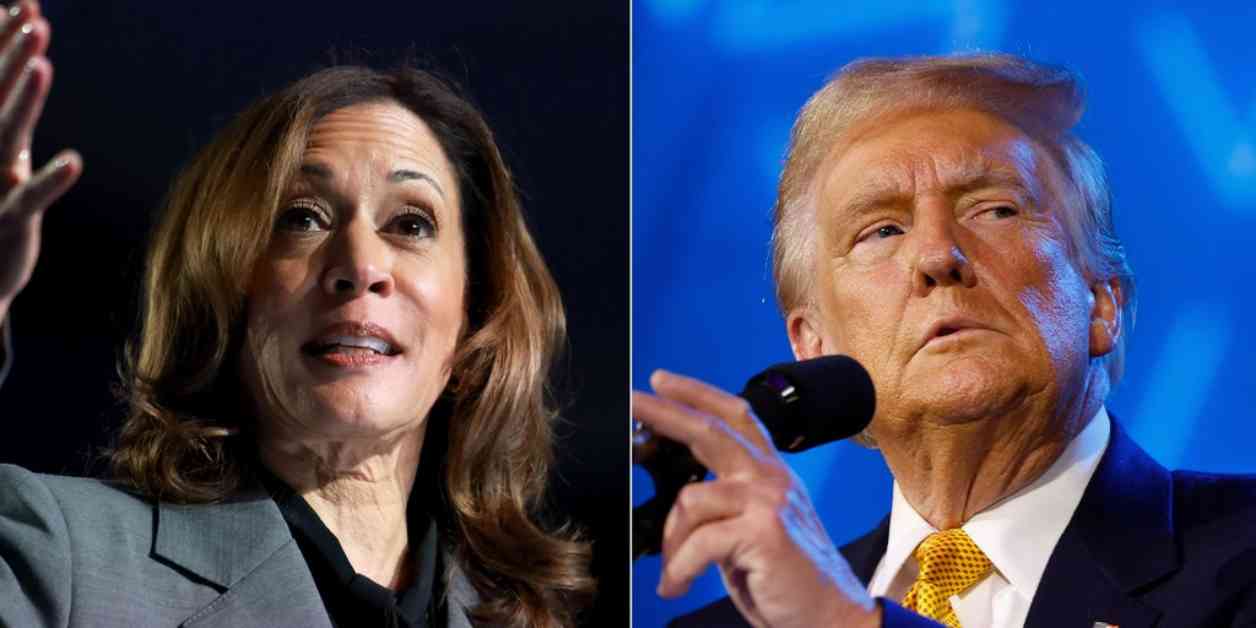Vice President Kamala Harris and former President Donald Trump are neck and neck in three crucial battleground states, according to recent polls conducted by Marist College. The surveys, released on Thursday, show the two candidates tied at 49% among likely voters in North Carolina. Of those who have made up their minds, 91% strongly support their chosen candidate.
In Arizona, Trump holds a slight lead over Harris, with 50% of likely voters leaning towards him compared to 49% for Harris. The same tight race is seen in Georgia, where Trump has the support of 50% of likely voters, while 49% are leaning towards Harris. These polls were conducted from September 19 to 24, surveying 4,643 registered voters across the three states who confirmed they would be voting in the upcoming election.
Fourteen Electoral College votes are at stake in Arizona, Georgia, and North Carolina. Trump won all three states in 2016 but lost Arizona and Georgia to President Biden in 2020. North Carolina, a swing state that Trump carried twice, has shown potential for a shift this year, particularly as the Republican candidate for governor, Mark Robinson, faces controversy over alleged posts on a porn website and is polling poorly against Democratic candidate Josh Stein, the state’s Attorney General.
Dr. Lee M. Miringoff, Director of the Marist Institute for Public Opinion, emphasized the importance of North Carolina in the electoral landscape, stating that it serves as a backup plan for both the Harris and Trump campaigns. The state’s division aligns closely with the patterns seen in the 2016 election, indicating a persistent political landscape despite recent changes.
In North Carolina, Harris and Trump are tied at 48% among independent likely voters, a demographic that played a crucial role in Biden’s victory in 2020. While Harris leads among Black voters by a large margin of 86% to 13%, she falls slightly behind Biden’s performance in 2020. Trump maintains an advantage with white voters, leading Harris 59% to 40%, although Harris has made gains in this demographic compared to Biden’s performance.
The top issues for North Carolina voters, according to the survey, include inflation (32%), preserving democracy (28%), immigration (14%), and abortion (11). These concerns reflect the diverse priorities of the state’s electorate and highlight the complexity of the political landscape.
Moving to Arizona, Harris leads Trump among independent voters by a margin of 51% to 47%. Biden won Arizona independents by a wider margin in 2020, indicating a potential shift in political preferences. Trump maintains an edge among white voters, leading Harris 51% to 48%, while the Latino vote remains competitive between the two candidates.
The key issues for Arizona voters, as identified in the survey, include preserving democracy (27%), inflation (26%), immigration (21%), and abortion (14). These issues reflect the broader national concerns facing voters and underscore the importance of addressing diverse policy areas in the election campaign.
In Georgia, Harris leads Trump among independent voters by five percentage points, with 51% leaning towards her compared to 46% for Trump. Biden’s success among Georgia independents in 2020 signaled a significant shift in the state’s political landscape, which has traditionally leaned Republican. Despite Trump’s challenges to the 2020 results in Georgia, voters express confidence in the fairness and accuracy of future elections.
The top concerns for Georgia voters, according to the survey, include inflation (34%), preserving democracy (24%), immigration (13%), and abortion (11). These priorities reflect the unique challenges facing Georgia voters and highlight the need for candidates to address a wide range of issues in their campaigns.
A recent Fox News national poll conducted after the first debate between Harris and Trump revealed that the economy remains a top concern for voters, with 39% citing it as their most pressing issue. Immigration and abortion trailed behind, indicating a clear focus on economic issues among the electorate.
Trump holds a five-point lead over Harris on economic issues in the Fox News poll, reflecting his traditional strength in this area. However, Harris’ messaging on housing costs and taxes has resonated with voters, particularly in the middle class, potentially narrowing Trump’s advantage on economic issues.
The evolving issue profile of the election favors Trump, according to Republican pollster Daron Shaw, who conducts the Fox News Poll alongside Democrat Chris Anderson. Despite Trump’s lead on economic issues, Harris’ targeted messaging on key policy areas has shown promise in appealing to a broader segment of the electorate.
In conclusion, the race between Harris and Trump in crucial battleground states like Arizona, Georgia, and North Carolina remains tight, with both candidates vying for support among diverse voter demographics. The top issues facing voters in these states reflect the broader national concerns, underscoring the complexity of the political landscape and the need for candidates to address a wide range of policy areas in their campaigns. As the election approaches, both Harris and Trump will need to navigate these challenges to secure victory in these critical battlegrounds.





















